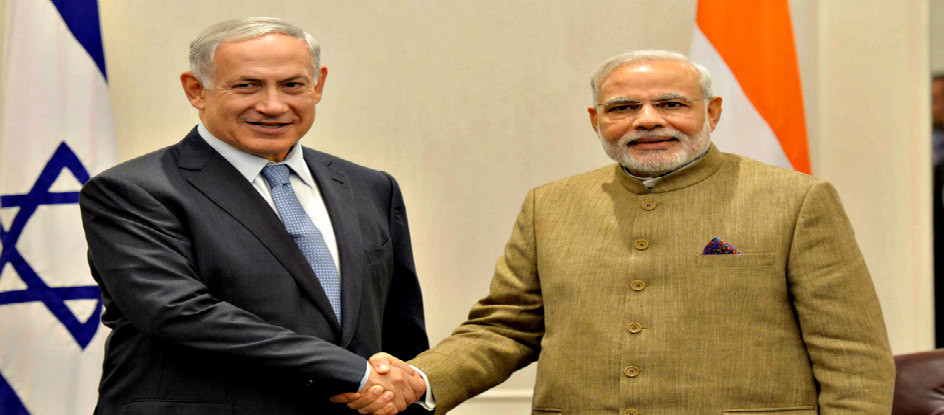Relationships with India were established just 25 years ago, and on Middle East issues is far from being our best friend. Yet, Israel’s relations with the giant state are heating up

The deepening relationship between Israel and India is marking another important milestone.
After the historic visit to Israel of Indian Prime Minister Narendra Modi last July, Israeli Prime Minister Netanyahu will arrive in New Delhi today, where the two are to meet once again. In their meeting, it is expected they will discuss not only the partnership between the two countries, but also the latest developments in the Middle East.
During the visit, Netanyahu will stop at a number of sites, including the Taj Mahal and the central location of the Mumbai terrorist attack in 2008.
The important aspect of the visit though, is that Netanyahu will be the keynote speaker at the RAISINA Dialogue, the annual conference of the Indian Ministry of External Affairs and the ORF Research Institute. The conference will include senior representatives from 86 countries, including the Egyptian foreign minister, the Russian foreign minister and the former Swedish prime minister.
Relations between Israel and India are on a slow and protracted rise, culminating in a warm and personal friendship between Netanyahu and Modi. But this was not always the case: India opposed the partition plan in 1947 and established diplomatic relations with Israel only in 1992 – even though it had received security assistance from Israel before. Netanyahu is the second prime minister to visit the subcontinent – Ariel Sharon preceded him in 2003.
A window for a gradual change in the bilateral relations between the countries opened in the last two decades. The Indian economy saw rapid growth, which stands at an average of eight percent annually, alongside political changes that have given the country a more liberal-capitalist character than in the past, reflected in the reduction of government involvement in the economy.
Under these circumstances, many Israeli companies found their way into the Indian market. The combination of Israeli human capital and Indian ingenuity has been widely reflected in deals involving arms, water sector management and many other industries, especially in the private sector.
This flourishing of the relationship can be witnessed in the official diplomatic plane as well, as India moves closer to Israel. India separated for the first time from the anti-Israel bloc at the UN when, in 2014, it abstained in the vote on the report of the UN Commission on the “Protective Edge” operation in Gaza.
This refinement of political criticism can also be found in official Indian Ministry of External Affairs terminology. Diplomatic expressions used to attack Israel, such as “unwarranted” or “disproportionate response,” are gradually fading away from the vocabulary of the Indian diplomatic corps.
Along with this positive trend, prominent anchors of Indian neutrality remain in place. India still clings to the worn-out perceptions of the Arab-Israeli conflict. The Indian government still seeks negotiations between Israel and the Palestinians, opposes the settlements and rejects the Trump Declaration of American recognition of Jerusalem as the capital of Israel.
Former US Ambassador to India David Melford explained in the past that “despite the good relations with Israel, India’s interests in forums such as the United Nations usually stick to those of the Non-Aligned Movement, especially in matters related to the Middle East.”
Along with the development of a more cautious and prudent foreign policy, the clear economic interest vis-à-vis Israel serves India’s aspiration to shape its national image as a developing superpower. As a balance between the Israeli and Arab considerations, the Indian establishment devotes considerable effort in preserving its broad interests with the countries of the Middle East and the Muslim world. At the same time, it is assisted by Israel for the purpose of technological innovation and fostering ties with the United States and the West.
In contrast to the marginal place the Palestinian issue had during Modi’s visit to Israel in July, reports in India indicate that in light of the vote against Trump’s decision, and that in light of Modi’s first visit to Ramallah next year, India will emphasize its support for the two-state solution.
Despite the disillusionment caused by India’s vote in the UN, the upcoming visit is intended to help both countries advance the economic interest in the geopolitical system. Both sides aspire to strengthen trade ties and seek to increase it from $ 4 billion to $ 10 billion.
Preliminary reports suggest that a key part of the talks between the leaders will focus on joint development of security products and the revival of a $500 million security deal that was canceled last week. According to reports, Israel will try to reach a free trade agreement between the two countries, and India is expected to arrange a direct air route from Air India due to the increase in traffic between the two countries: in 2016 there was a 22.8% increase in traffic and the number of passengers on direct flights reached a record of 158,000.
The flourishing of mutual ties between Israel and India is an achievement for the right wing that is gaining strength in India after many years of left-wing rule. Even if it is not as one-dimensional and enthusiastic as many tend to believe. The Palestinian issue remains a bone of contention, rooted in India’s centrality in the group of “non-aligned” nations.
Under these conditions, the renewal of the arms deal is expected to be the modest victory that Netanyahu can bring with him.
____________________
Oshrit Birvadker is an expert on Indian politics and a doctoral student in the Department of Middle East Studies at Bar-Ilan University, specializing in relations between India and the Persian Gulf.
[Find this article interesting? You can find more in depth articles on Israel and the Middle East @en.mida.org.il]



